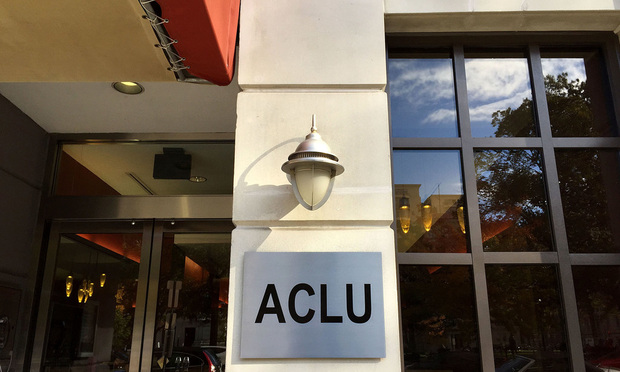Read Their Own Words: Finalists for Chief State's Attorney Job Face Hot Issues
The ACLU of Connecticut asked 17 questions to finalists vying for the chief state's attorney job.
January 15, 2020 at 03:23 PM
5 minute read
 ACLU office in Washington, D.C. Photo: Diego M. Radzinschi/ALM
ACLU office in Washington, D.C. Photo: Diego M. Radzinschi/ALM
The four finalists in the running to become Connecticut's top prosecutor aren't saying much publicly during the job interview process.
But their answers to a 17-question survey from the ACLU of Connecticut's Smart Justice Campaign provide some insight into how they might run the office, if they rise to chief state's attorney.
Click on the finalists' names below to read their full survey answers:
The think tank's questions elicit "yes" or "no" responses, but many also start with a premise that a positive response serves "fairness and transparency," an interview tactic that appeared designed to elicit certain answers for the record.
One question, for instance, asked: "Will you commit to fairness and accountability by supporting legislation creating an independent conviction integrity unit to review and investigate innocence claims presented by people convicted of violent offenses? Please give a clear 'Yes' or 'No' to the question and any explanation."
 Richard Colangelo Jr.
Richard Colangelo Jr.Finalist Richard Colangelo Jr., who's been the state's attorney for the Judicial District of Stamford/Norwalk since July 2015, noted the disparate issues.
"No," he answered. "While I commit to fairness and accountability, I do not believe legislation is (needed) to accomplish a conviction integrity unit. If I am the CSA, I plan on having a conviction integrity unit."
Colangelo is vying for the job, along with Kevin Lawlor, deputy chief state's attorney for operations; Erik Lohr, associate attorney general for legal counsel in the Office of the Attorney General; and Maureen Platt, state's attorney for the Judicial District of Waterbury. They are finalists to replace former Chief State's Attorney Kevin Kane, who stepped down Dec. 1.
Connecticut's Criminal Justice Commission is expected to choose Kane's replacement by Jan. 30.
 Erik Lohr
Erik LohrThe attorneys answered the survey from the ACLU's 20-month-old Smart Justice Campaign.
The group's mission includes a goal to "cut Connecticut's jail and prison population by 50 percent, and to end racial disparities in our state's justice system."
Claudine Fox, Smart Justice Campaign's campaign manager, conceded the ACLU has a point of view on the questions asked, and was looking for support from the four job candidates.
Fox said she was pleased all four finalists supported Public Act 19-59, which deals with prosecutor transparency.
 Maureen Platt/AP
Maureen Platt/AP"The bill is important because it allows us to create a landscape on who is consistently being charged within our prison system," Fox said. "It creates a standard of racial justice and allows all of the 13 state's attorney judicial districts to, together, examine that data coming in."
But the ACLU wasn't happy with some of the responses about its question on closing the Manson Youth Institution in Cheshire.
"We are disappointed, particularly with the federal DOJ [Department of Justice] report examining living situations and how the facility is being run," Fox said. "It appears some of the juveniles in the facility are not receiving appropriate contact, and are being left inside cells for multiple hours."
Colangelo, Lawlor and Platt provided, in many cases, detailed explanations of their answers, while Lohr gave "yes" or "no" responses for the most part.
For instance, Colangelo said he didn't believe reducing the length of state's attorneys terms from eight years to four years was a prudent idea. When asked whether he supported capping all prison sentences to 20 years, he said that was in the purview of the state Legislature.
 Kevin Lawlor
Kevin LawlorMeanwhile, Lawlor said he would be in favor of—and had already drafted a proposed policy—to support legislation creating an independent conviction integrity unit to review and investigate innocence claims presented on behalf of individuals convicted of violent crimes.
And Platt, for instance, said she did not favor capping prison sentences at 20 years, but that "long-term incarceration should always be imposed as a last resort."
For his part, Lohr said he would support legislation to change the state's use-of-force standard to ensure that police killings were only considered justified in cases that officers, through their own actions, did not create a situation in which deadly force was necessary.
Related story:
Who Will Replace Connecticut's Top Prosecutor? Here's the Short List
This content has been archived. It is available through our partners, LexisNexis® and Bloomberg Law.
To view this content, please continue to their sites.
Not a Lexis Subscriber?
Subscribe Now
Not a Bloomberg Law Subscriber?
Subscribe Now
NOT FOR REPRINT
© 2025 ALM Global, LLC, All Rights Reserved. Request academic re-use from www.copyright.com. All other uses, submit a request to [email protected]. For more information visit Asset & Logo Licensing.
You Might Like
View All
'They Are Never Going to Learn': Geico Not Protected by Litigation Privilege
3 minute read
K&L Gates Files String of Suits Against Electronics Manufacturer's Competitors, Brightness Misrepresentations
3 minute read
Eleven Attorneys General Say No to 'Unconstitutional' Hijacking of State, Local Law Enforcement
3 minute readTrending Stories
Who Got The Work
J. Brugh Lower of Gibbons has entered an appearance for industrial equipment supplier Devco Corporation in a pending trademark infringement lawsuit. The suit, accusing the defendant of selling knock-off Graco products, was filed Dec. 18 in New Jersey District Court by Rivkin Radler on behalf of Graco Inc. and Graco Minnesota. The case, assigned to U.S. District Judge Zahid N. Quraishi, is 3:24-cv-11294, Graco Inc. et al v. Devco Corporation.
Who Got The Work
Rebecca Maller-Stein and Kent A. Yalowitz of Arnold & Porter Kaye Scholer have entered their appearances for Hanaco Venture Capital and its executives, Lior Prosor and David Frankel, in a pending securities lawsuit. The action, filed on Dec. 24 in New York Southern District Court by Zell, Aron & Co. on behalf of Goldeneye Advisors, accuses the defendants of negligently and fraudulently managing the plaintiff's $1 million investment. The case, assigned to U.S. District Judge Vernon S. Broderick, is 1:24-cv-09918, Goldeneye Advisors, LLC v. Hanaco Venture Capital, Ltd. et al.
Who Got The Work
Attorneys from A&O Shearman has stepped in as defense counsel for Toronto-Dominion Bank and other defendants in a pending securities class action. The suit, filed Dec. 11 in New York Southern District Court by Bleichmar Fonti & Auld, accuses the defendants of concealing the bank's 'pervasive' deficiencies in regards to its compliance with the Bank Secrecy Act and the quality of its anti-money laundering controls. The case, assigned to U.S. District Judge Arun Subramanian, is 1:24-cv-09445, Gonzalez v. The Toronto-Dominion Bank et al.
Who Got The Work
Crown Castle International, a Pennsylvania company providing shared communications infrastructure, has turned to Luke D. Wolf of Gordon Rees Scully Mansukhani to fend off a pending breach-of-contract lawsuit. The court action, filed Nov. 25 in Michigan Eastern District Court by Hooper Hathaway PC on behalf of The Town Residences LLC, accuses Crown Castle of failing to transfer approximately $30,000 in utility payments from T-Mobile in breach of a roof-top lease and assignment agreement. The case, assigned to U.S. District Judge Susan K. Declercq, is 2:24-cv-13131, The Town Residences LLC v. T-Mobile US, Inc. et al.
Who Got The Work
Wilfred P. Coronato and Daniel M. Schwartz of McCarter & English have stepped in as defense counsel to Electrolux Home Products Inc. in a pending product liability lawsuit. The court action, filed Nov. 26 in New York Eastern District Court by Poulos Lopiccolo PC and Nagel Rice LLP on behalf of David Stern, alleges that the defendant's refrigerators’ drawers and shelving repeatedly break and fall apart within months after purchase. The case, assigned to U.S. District Judge Joan M. Azrack, is 2:24-cv-08204, Stern v. Electrolux Home Products, Inc.
Featured Firms
Law Offices of Gary Martin Hays & Associates, P.C.
(470) 294-1674
Law Offices of Mark E. Salomone
(857) 444-6468
Smith & Hassler
(713) 739-1250











